Guide: How to Use Qwoted to Earn More Whitehat Backlinks
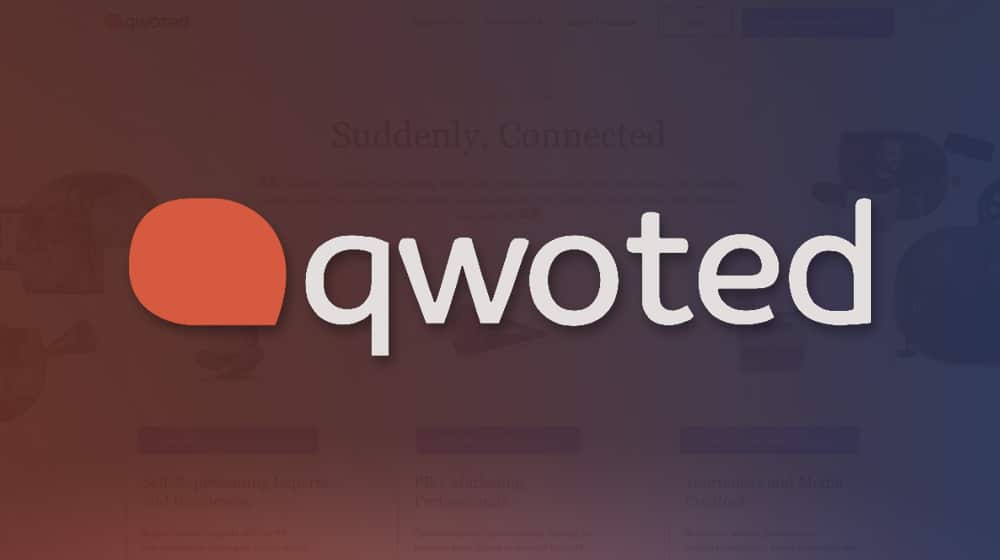
There are many different ways you can earn backlinks for your blog.
- You can perform outreach to find other blogs that are willing to allow you to guest post with a link to your own site in the content.
- You can build your site to a level where your personal and business reputation means you're invited to contribute.
- You can participate in social media roundtables and send quotes to blogs that do expert roundup posts.
One option surprisingly flying under the radar for many marketers is to use a service like Qwoted. What is it, how does it work, and how can you use it to build backlinks? Let's talk about it.
What is Qwoted?
Qwoted is one of the current slate of web services modeled after the original Help A Reporter Out, or HARO service.
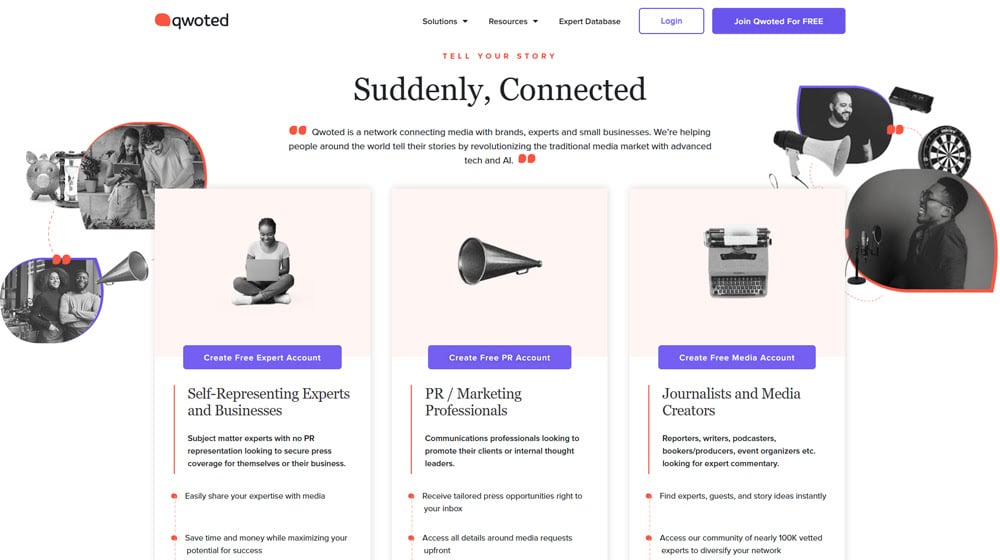
It's meant to connect two groups of people:
- The people who own businesses and are experts in a given subject who want to contribute to reporting, publications, and other media on that topic
- The people who create content for publishing houses, magazines, blogs, and other media, who need expert opinions and quotes to round out their work.
They aren't the first site to offer this service, and they certainly won't be the last.
Qwoted is owned by the financial PR firm Vested, which some people find to be something of a conflict of interest. Qwoted isn't any less effective for it, but there are rumors that Vested uses the platform to locate more valuable customers for themselves, leaving the service to flounder a little.
Whether or not there's any substance to those rumors, I can't say.
How Does Qwoted Work?
It's quite simple in concept, though, as always, the devil is in the details.
Journalists and other content producers register a Media account. Media accounts are able to post opportunities and solicitations for information, which show up in the Qwoted platform.
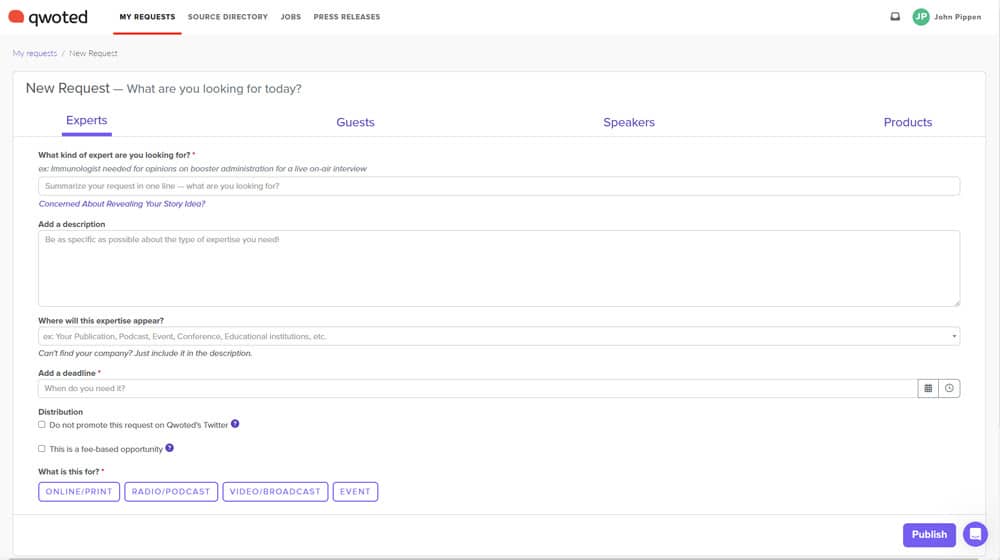
On the other side of the relationship are the expert and PR accounts. Experts, small businesses, individuals looking to represent themselves, and others register expert accounts. PR firms and companies representing multiple other businesses register PR accounts. Both groups can see the opportunities posted by Media accounts and can submit responses to them.
Media accounts can then see the responses they get, along with some data about the accounts, including certain metrics and estimates from Qwoted as to the relevance of the response. They can pick whichever responses they want and use them in the content they produce.
As an added twist, media opportunities are anonymized at the outset. You have to spend a credit to unlock one that you want to submit a pitch to, and only then do you see what platform submitted the request. It's an interesting, although not entirely effective, way of trying to minimize the spam being sent to the biggest names.
Additionally, if you unlock a pitch, you're essentially locked into it. You have to submit a pitch before you go and unlock more opportunities. This way, Qwoted tries to cut down on fishing for those big publishers.
Qwoted also has a few other kinds of requests.

While the standard Q&A or Expert Opinion request is what you're most likely to be aiming for, at least to start, they also offer:
- Product pitches. A brand looking to review certain kinds of products can put out a request for creators of those products to submit their own.
- Guest pitches. These are guests as in visitors to a podcast or partners for a YouTube video; the requester can put out a request asking for certain experts to hook up.
- Speaker requests. Same deal, seeking a guest speaker for an event or other opportunity.
For the purposes of our post, I'm generally just focused on standard requests. The other kinds are a bit outside of my usual wheelhouse and are also less common on the platform.
As an expert account, you browse through anonymized requests, looking for any that are asking about your subject of expertise. When you find one, you pay a credit to unlock it, and submit a pitch.
If your pitch is accepted, the media producer can then use your quote in their media. Usually, they'll cite you by name, and sometimes, they'll include a link. That's the biggest prize, but Qwoted media producers are not required to include a link if they don't want to or if it goes against their site's guidelines.
Are Qwoted Links White Hat?
Yes!* (notice the asterisk).
A lot of people feel like services like HARO or Qwoted are somehow sketchy, but the truth is, there's nothing underhanded about them. If you were able to pay extra to guarantee a link or pay extra to guarantee an accepted pitch, then it might be a little shadier, but a lot of the time, there's no way for an external source like Google to ever know a quote and link came from a platform like Qwoted in the first place. It's all above board and perfectly legitimate. In fact, that's why the returns are so difficult to get.
Now, the reason there's an asterisk: there are occasionally low quality sites on platforms like Qwuoted. I've seen deindexed sites, sites with 0 traffic and tens of thousands of pages, sites that publish 100 times per day. Not great. On CisionOne (formerly called Connectively and HARO)) and Featured.com (formerly Terkel), you can spot and avoid these. But when things are anonymized, it's a bit harder. On Featured.com and Qwuoted, this is a lot rarer than on Connectively/HARO, so I wouldn't worry about it too much.
How Much Does Qwoted Cost?
This is the trick of Qwoted.
For media accounts, Qwoted is free. After all, without good media accounts, the platform would be worthless, and media accounts are in high enough demand through personal emails and their own tip lines that they never need a service like Qwoted. So, Qwoted has to be valuable enough for them to want to use, otherwise the whole concept falls on its face.
For subject matter expert accounts, Qwoted is "free." I put free in quotes, though, and here's why.
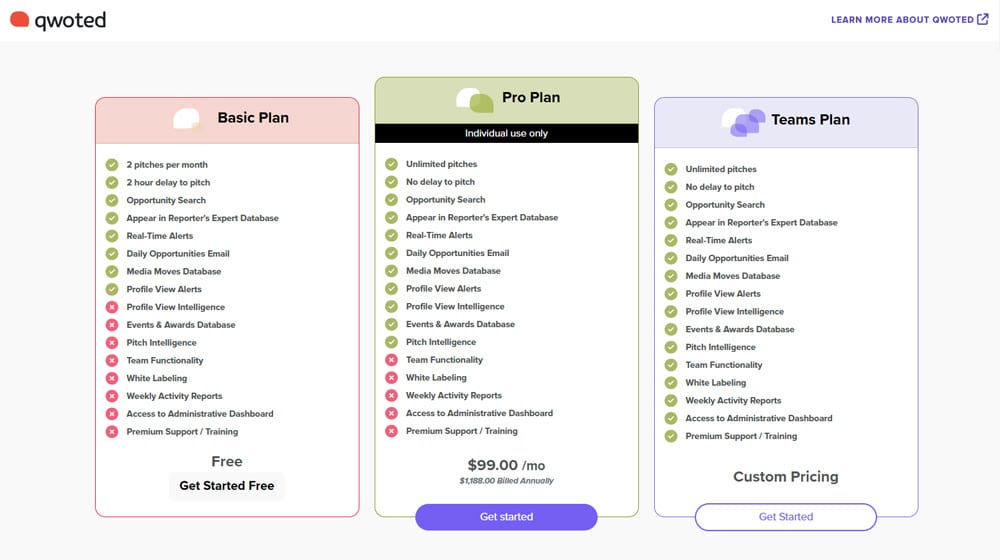
The free plan with Qwoted is very limited. You get up to two pitches per month, but worse than that, you're on an enforced two-hour delay before you can even see media requests. That means all the people paying for accounts can have their pitches in before you even see that a request exists, and in a lot of cases, that means the request is going to be filled before you even see it.
The basic paid plan for an expert account is $100 per month. It removes both the limit on pitches and the delay in seeing requests. It also gives you some additional AI-driven analytics and "pitch intelligence" to try to help you create and submit better pitches.
Side note: It's a little ironic that Qwoted uses AI to facilitate the process. They're also notorious for banning Experts who use AI to write pitches. It's good to keep the AI cloudiness out of the relationship, but when you then implement your own, it just makes it worse for everyone involved, in my opinion.
Qwoted also has a teams plan, which is their full for-PR-firms plan and includes white labeling, an admin dashboard, and some other high-end features. They don't say what the pricing is for that one, and it likely scales based on the number of clients you're bringing to the table anyway.
What Are the Benefits of Using Qwoted?
If all of this sounds like a lot of work for the thin possibility of a backlink, well, you're not entirely wrong. $1,200 a year is a steep price. So, let's talk about what you get out of using Qwoted.
First is the link, of course. If you manage to land a backlink – which isn't guaranteed but does happen – it's often from a fairly big-name platform. A lot of household name publishers, including the Associated Press, HuffPo, Forbes, Reuters, the NYT, and others, all have used Qwoted. Of course, there are also thousands of smaller publishers, and since you don't know who the publisher is until you unlock a request, you can't aim to pitch only to the high-DA domains.
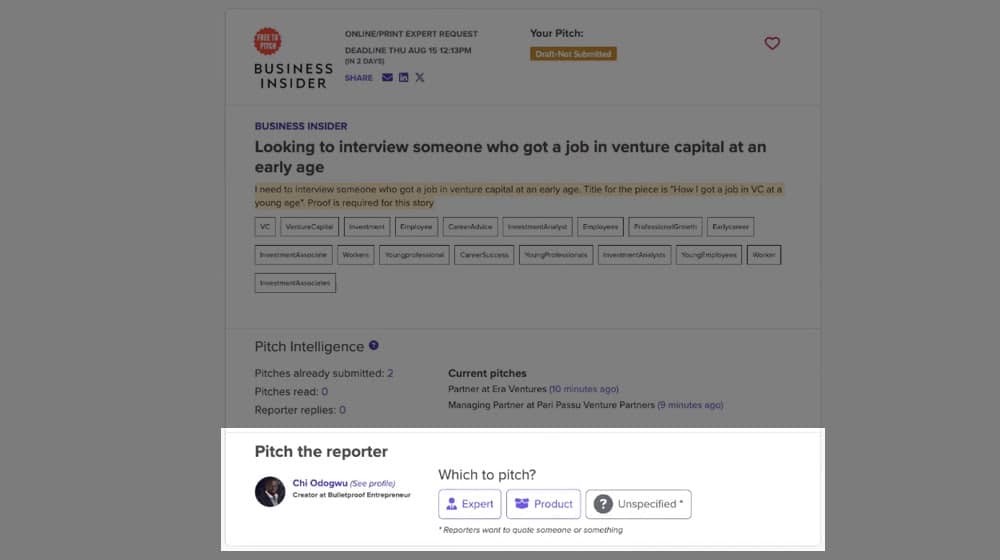
Even if you don't get a link, you still get an unlinked mention. Unlinked mentions aren't explicitly as valuable as a backlink, of course, but they're still quite useful for things like building EEAT. The more your name is out there as a source, the better off you are. After all, why would a journalist quote you if you didn't know what you were talking about? It's a slow snowball, but once you get the ball rolling, your reputation can be a huge asset.
It's also, as I mentioned, surprisingly an underutilized path for outreach. It's not as effective as a DIY outreach to publishers and journalists directly, but it's a smoother process and requires less time and effort. It can also lead to better relationships down the road if you follow up and engage with the content producers directly.
What Are the Challenges of Using Qwoted?
Of course, it's not all simple benefits. There are challenges to effectively using Qwoted.
For one thing, even with the limitations in place, it can be pretty spammy. You really need to be paying for an account because that two-hour advantage is essentially required to get ahead of the spam. A lot of media accounts get somewhere between 10 and 50 responses to their requests in the first few hours, and the longer they're up, the more they flood in. You need to do a lot to stand out.
It can also be a lot of work for, unfortunately, relatively little return. The price of admission is pretty high when you're never guaranteed a link, and the other benefits, while good, are still minimal in the grand scheme of things. It takes a long time and a lot of them built up over time to prove tangibly beneficial.
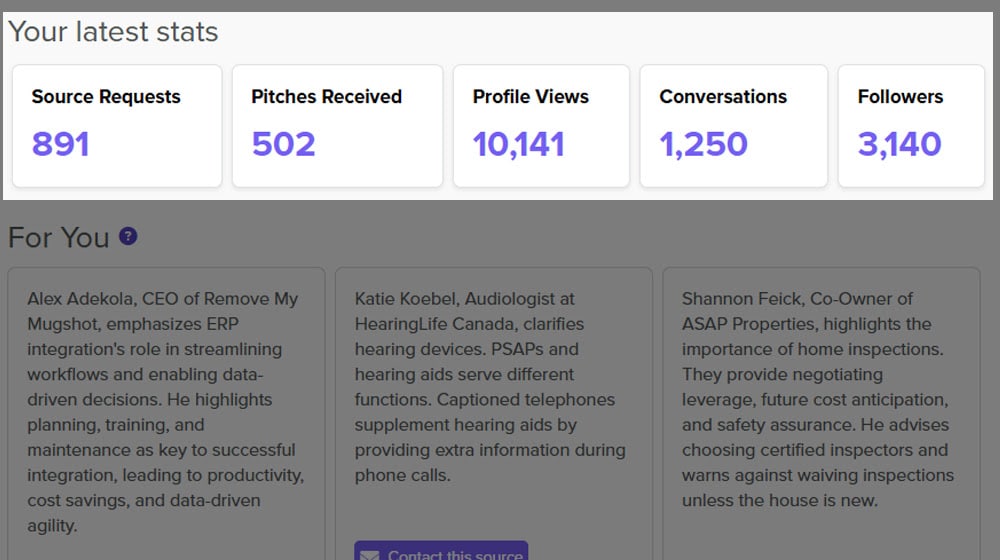
It can also be surprisingly tricky to know whether or not you've even gotten a link or even if your response has been published. Some platforms have a feedback mechanism for this, but Qwoted doesn't really. It can be a mess to track the efficacy of your outreach, and that's never a good sign for a platform you have to spend $100 a month on.
Still, despite all of that, it can still be valuable, especially if you know how to make your pitches stand out.
How to Make Your Qwoted Pitches More Effective
When a media publisher or journalist posts a request, they want to have relevant and useful information from a subject matter expert given to them. So, you need to be the stand-out, most useful option. Here are my top tips for getting your pitches accepted.
Don't use AI. In fact, don't even use something like Grammarly because accepting Grammarly changes can mark your content as partially AI ever since Grammarly started investing in AI. Journalists can flag you if they believe your responses are AI-generated, and that can get you completely banned from the platform. I know it's faster, but just don't do it.
Align your response to their needs. In particular, customize your title and the information you give to the media request to be as aligned with their needs as possible. If necessary, find someone in your organization with even more relevant skills and use them as the headliner.
Front-load your value. One of the worst things you can do is beat around the bush and waste everyone's time. If you aren't getting to the point in the first couple of sentences, you're probably not going to be read all the way through, let alone accepted. Make sure you can showcase your value up front, including an explanation of your expertise.
Personalize your pitch. Generic "to whom it may concern" pitches show that you're not putting the effort into the pitch. Do your research – quickly – when you unlock a request and craft a response that is personalized to the individual, not generic to the subject. The more your pitch looks like it could be pasted into a dozen other requests, the less valuable it is.
Answer everything. Sometimes, a request is just one question; other times, it's basically a whole interview. Read it in detail and address everything; don't skip, gloss over, or ignore parts of it. Comprehensive answers are best.
Avoid fluff. Time is money, and words take time to write and to read. The snappier your responses, the better.

Use my service. I know all of this is a ton of work, and even once you're experienced with it, it can be a significant task. So, why not use my service? I'm not a PR expert, but I'm familiar with HARO and the like and can help you through the Qwoted process without you having to lift a finger.
Just check out my service page and drop me a line to get started.



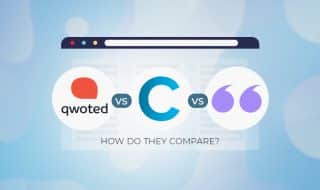






Comments